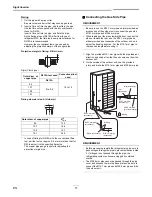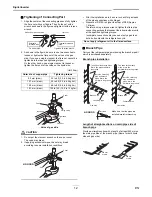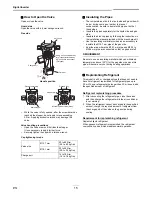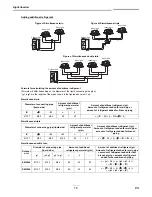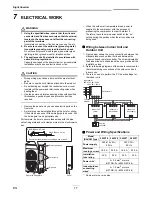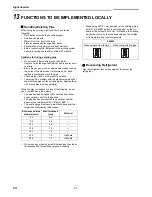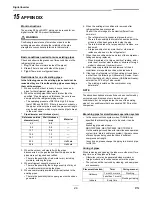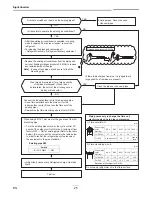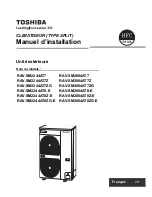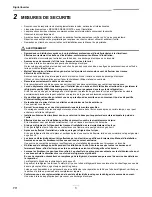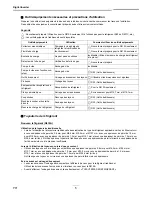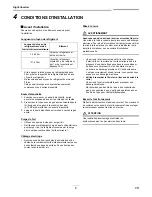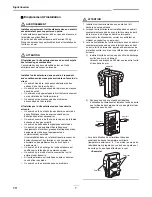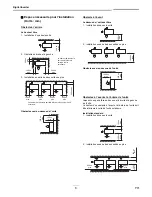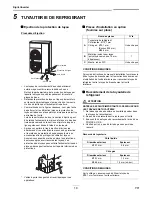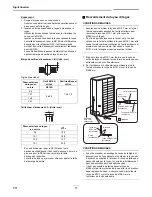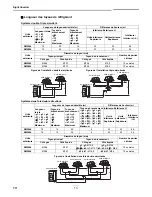
24
EN
Digital Inverter
15
APPENDIX
Work instructions
The existing R22 and R407C piping can be reused for our
digital inverter R410A product installations.
WARNING
Confirming the existence of scratches or dents on the
existing pipes and confirming the reliability of the pipe
strength are conventionally referred to the local site.
Basic conditions needed to reuse existing pipes
Check and observe the presence of three conditions in the
refrigerant piping works.
1.
Dry
(There is no moisture inside of the pipes.)
2.
Clean
(There is no dust inside of the pipes.)
3.
Tight
(There are no refrigerant leaks.)
Restrictions for use of existing pipes
In the following cases, the existing pipes should not be
reused as they are. Clean the existing pipes or exchange
them with new pipes.
1. When a scratch or dent is heavy, be sure to use new
pipes for the refrigerant piping works.
2. When the existing pipe thickness is thinner than the
specified “Pipe diameter and thickness,” be sure to use
new pipes for the refrigerant piping works.
• The operating pressure of R410A is high (1.6 times
that of R22 and R407C). If there is a scratch or dent on
the pipe or a thinner pipe is used, the pressure strength
may be inadequate, which may cause the pipe to break
in the worst case.
*
Pipe diameter and thickness (mm)
3. When the outdoor unit was left with the pipes
disconnected, or the gas leaked from the pipes and the
pipes were not repaired and refilled.
• There is the possibility of rain water or air, including
moisture, entering the pipe.
4. When refrigerant cannot be recovered
• There is the possibility that a large quantity of dirty oil
or moisture remains inside the pipes.
5. When a commercially available dryer is attached to the
existing pipes
• There is the possibility that copper green rust has been
generated.
6. When the existing air conditioner is removed after
refrigerant has been recovered.
Check if the oil is judged to be clearly different from
normal oil.
• The refrigerator oil is copper rust green in color:
There is the possibility that moisture has mixed with the
oil and rust has been generated inside the pipe.
• There is discolored oil, a large quantity of residue, or a
bad smell.
• A large quantity of shiny metal dust or other wear
residue can be seen in the refrigerant oil.
7. When the air conditioner has a history of the compressor
failing and being replaced.
• When discolored oil, a large quantity of residue, shiny
metal dust, or other wear residue or mixture of foreign
matter is observed, trouble will occur.
8. When temporary installation and removal of the air
conditioner are repeated such as when leased etc.
9. If the type of refrigerator oil of the existing air conditioner
is other than the following oil (Mineral oil), Suniso, Freol-
S, MS (Synthetic oil), alkyl benzene (HAB, Barrel-freeze),
ester series, PVE only of ether series.
• The winding-insulation of the compressor may
deteriorate.
NOTE
The above descriptions are results have been confirmed by
our company and represent our views on our air
conditioners, but do not guarantee the use of the existing
pipes of air conditioners that have adopted R410A in other
companies.
Branching pipe for simultaneous operation system
•
In the concurrent twin system, when TOSHIBA has
specified that branching pipe is to be used, it can be
reused.
Branching pipe model name:
RBC-TWP30E2, RBC-TWP50E2, RBC-TRP100E
On the existing air conditioner for simultaneous operation
system (twin, triple, double twin system), there are cases
of branch pipes being used that have insufficient
compressive strength.
In such case, please change the piping to a branch pipe
for R410A.
Curing of pipes
When removing and opening the indoor or outdoor unit for a
long time, cure the pipes as follows:
•
Otherwise rust may be generated when moisture or
foreign matter due to condensation enters the pipes.
•
The rust cannot be removed by cleaning, and new pipes
are necessary.
Reference outside
diameter (mm)
Wall thickness
(mm)
Material
6.4
0.8
—
9.5
0.8
—
12.7
0.8
—
15.9
1.0
—
19.1
1.2
—
22.2
1.0
Half hard
28.6
1.0
Half hard
Placement location
Term
Curing manner
Outdoors
1 month or more
Pinching
Less than 1 month
Pinching or taping
Indoors
Every time


